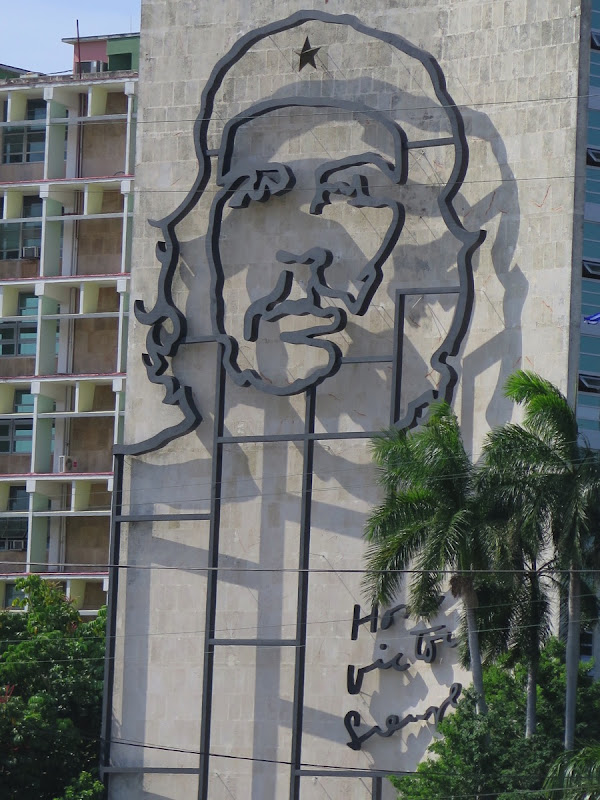 |
| Che Guevara is revered and his image is everywhere, here it commands the view in Revolution Square. |
On August 4 we had an hour with an economics professor from the University of Havana. He spoke at length. Here are some notes:
~ The GDP of Cuba is holding at 4-5% for the last 20 years. This is better than in the 1990's when after the end of the Soviet Union the GDP decreased by 35%. Nevertheless, last year the GDP only increased 1.3% and this is not enough.
~ Nineteen percent of the Cuban population is over 60 years old. Over the next ten years, that part of the population will increase to 25%, with a life expectancy of 79 years. So, there will be a small number of workers supporting a large number of elderly people very soon.
~ Some of the reason why the GDP is so slow is due to "internal affairs," (ie. domestic policy and issues.) Agriculture is responsible for 4% of the GDP but employes 18% of the population. Industry used to be responsible for 25% of the GDP but has decreased to 14%. This is due to the way the economy was managed in the past 50 years. So, more of the workforce needs to transition to jobs that help the economy more.
| Looking at the international money collection at La Casa paladar |
~ In 2011, the parliament approved a document, paraphrased "Economic and Social Development." Before being passed, it was "talked about with everybody." This was before President Obama made his announcement this past December. The plan has several important components that will represent change, slowly. They also all point to managing "Cuba's economy with economics, not politics.":
1) The State should not own and manage everything-- the non-state sector should be encouraged. Over the next 5 years a goal is to increase the number of people employed in the private sector from 100,000 to 500,000. (That's huge. It will represent 24-35% of the labor force.)
2) Downsize the ministries of industries. Cuba had a separate ministry for every, single industry. The plan calls to consolidate them under a single Ministry of Industry.
3) Give more authority and independence to the local governments of cities and provinces. (This is huge too, because we later learned that there is basically no local government-- just some neighborhood associations.)
4) Figure out a way for foreign investment. This economist thinks that the economy cannot grow without Cuba having foreign investment, and that about 20% of the GDP should be invested. However: Cuba doesn't have 20% to invest, AND, the US embargo has made investment in other countries difficult if not nearly impossible.
~ Where might the Cuban economy look for growth and development?
1) Knowledge based economy. Cuba has a literate workforce, but there has been a "brain drain," since it is very difficult to have enough money for R&D, and even academically well educated people earn a very low salary.
2)Tourism. Sun and beach is 70% of the current tourist trade-- and Cuba will have to compete with the whole Caribbean for this. But specialize tourism is a really good idea (in the professor's opinion and mine.) These could include ecotourism, medical tourism and cultural tourism.
~ President Obama's December 17 announcement was a surprise in Cuba. The only signs were that the NYT published about six articles about Cuba in the months preceding the announcement. (And I intend to look them all up-- go NYT!)
~ In the first six months, the Cuban economy grew 4.7%-- so this is a good sign.
 |
| Hotel Nacional displays photos of heads of state who have visited. |
Two more HUGE points:
~ Cuba should not put itself in a position where it depends, yet again, on another country. It's such a long list from history: Spain, the US, the USSR, Venezuela and, somewhat, China. It hasn't been good for Cubans, and it hasn't been good for its neighbor the USA, either.
~ The cost of the embargo has been huge, and estimate of $118,200 billion dollars. Embargo is a system that has many layers to its removal.
While my photos of the trip will show many lovely places and a beautiful country, travel in Cuba makes the humanitarian consequences of the embargo abundantly clear. It is embarrassing. It is also embarrassing to realize that our democratic process is now going to slow down any official ending to the embargo as we begin a presidential election cycle.
 |
| Statue of Jose Marti in a monument boarding Revolution Square |
No comments:
Post a Comment